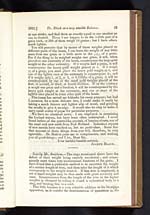Joseph Black (1728-1799)
Letter from Dr Black to James Smithson Esq. describing a very sensible balance
1825.]
Dr. Black on a very sensible Balance.
53
at one stroke, and find them as exactly equal to one another as
can be desired. Those I use happen to be the 1-30th part of a
grain each, or 300 of them Weigh 10 grains; but I have others
much lighter.
You will perceive that by means of these weights placed on
different parts of the beam, I can learn the weight of any little
mass from one grain or a little more to the 1/1200 of a grain.
For if the thing to be weighed weighs one grain, it will, when
placed on one extremity of the beam, counterpoise the large gold
weight at the other extremity. If it weighs half a grain, it will
counterpoise the heavy gold weight placed at 5. If it weigh
6/10 of a grain, you must place the heavy gold weight at 5, and
one of the fighter ones at the extremty to counterpoise it; and
if it weighs only 1, or 2, or 3, or 4-100ths of a grain, it will be
counterpoised by one of the small gold weights placed at the
first, or second, or third, or fourth division. If on the contrary
it weigh one grain and a fraction, it will be counterpoised by the
heavy gold weight at the extremity, and one or more of the
lighter ones placed in some other part of the beam.
This beam has served me hitherto for every purpose; but had
I occasion for a more delicate one, I could make it easily by
taking a much thinner and lighter slip of wood, and grinding
the needle to give it an edge. It would also be easy to make it
carry small scales of papar for particular purposes.
We have no chemical news. I am employed in examining
the Iceland waters, but have been often interrupted. I never
heard before of the quartz-like crystals of barytes aërata, nor of
the sand and new earth from New Holland. Indistinct reports
of new metals have reached us, but no particulars. Some fur-
ther account of these things from you will, therefore, be very
agreeable. Dr. Hutton joins me in compliments, and wishing
you all good things; and I am, Dear Sir,
Your faithful humble servant,
JOSEPH BLACK.
________
Note by Mr. Smithson.—The rings mentioned above have the
defect of their weight being entirely accidental; and conse-
quently most times very inconvenient fractions of the grain. I
have found that a preferable method is to ascertain in the weight
of a certain length of wire, and then take the length of it which
corresponds to the weight wanted. If fine wire is employed, a
set of small weights may be thus made with great accuracy and
ease. Inconvenience from the length of the wire in the higher
weights is obviated by rolling it round a cylindrical body to a
ring, and twisting this to a cord.
This little balance is a very valuable addition to the blowpipe
apparatus, as it enables the determination of quantities in the


